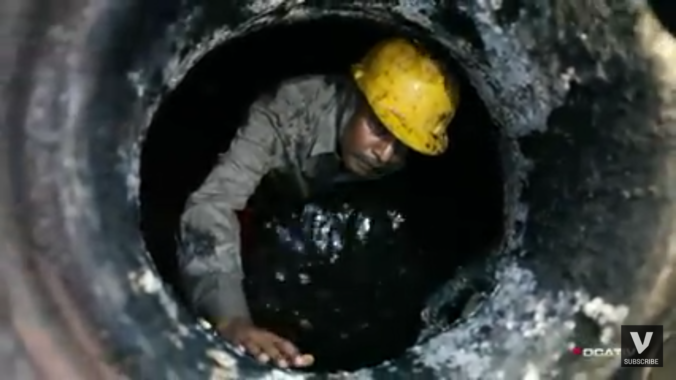It is early in the morning. Leela and her daughter Sita are preparing breakfast for their family of 5.
They live in a shanty that looks no different from the hundreds of other houses in their ghetto that dots the railway line.
Sita’s two younger brothers are still asleep. Her father Suresh is getting ready work.
Work that he finds despicable, but submits to nevertheless for his fate was sealed the day he was born in a Dalit family.
Dalits are a section of the Indian society that finds itself at the bottom of the Hindu Caste hierarchy. For hundreds of years, they have been treated as untouchables, destined to do all the lowly tasks in the society.
As much as Suresh can trace back his ancestry, all of his forefathers were manual scavengers, people who take care of the human waste santation of their community.
Even in the modern era of technology, urban sanitation is still dependent on people like Suresh climbing down the sewers to manually get rid of decaying human excrement.
It is a thankless job which people from lower castes still do mostly because the society has destined them to never rise above this age old practice.
This is a means of survival, with both feet sinking slowly in marshy sewage every Single workday.
He works with no job guarantee, irregular pay, no safety equipment and worst of all with no hope.
Deaths are common in this ‘profession’, if you will. And 9 out of 10 manual scavengers do not make past the age of 60 because of constant exposure to toxic gases in the sewer lines.
The only way to cope with the work environment is alcohol. Maybe this is the only job in the world where the person must show up drunk to go on with the work.
———
Sita brings two flatbreads and some curry for her father. Each morsel is punctuated by a generous gulp of the locally brewed liquor.
Hurriedly he leaves for work after his meal.
The two boys awaken to the sound of a bicycle bell. Their 4 year old friend Harish is on the doorstep with his new bicycle.
Harish’s father was Suresh’s work mate. He passed away a month ago in a sewer after exposure to toxic fumes.
It was an tragedy that took no one by surprise.
Perhaps the worst of tragedies is when a tragedy becomes a norm.
There was no hope of any help for orphaned Harish and his mother.
By the grace of a kind person who reported the incident on social media,
People pooled in money to help the family. A corpus of 30 lakhs was collected which now is a fixed deposit in the name of Harish. The interest on the amount pays for his education and household expenses.
He also got a bicycle his father had promised on his birthday.
The demise of his father in a way, brought much needed financial relief to the family.
Of course, this is an exception than a norm.
Not a day passes without a sewage worker succumbing in the chamber of death.
Nobody cares.
The government, even less than God.
But the ring of Harish’s bicycle bell gives some people hope that if the goverment offers a deaf ear, maybe compassionate citizens will help in the case of a loss.
It is better than having no hope at all.
Leela calls Harish in and all the kids line up for breakfast.
She can’t help but think how different the lives of her kids is going to be as compared to Harish’s.
‘Would she ever be able to give access to good education to her children and hope that they become the first generation in their family to not be a sewage worker?’ she wonders.
In Indian culture, the wife wishes a long life upon her husband.
But could Leela ever wish for that, when she knows that her husband would never live beyond 60.
The sludge in the sewer is quicksand, destined to engulf all lives that set foot in it.
In a fair world, she would wish life on her husband,
But today, seeing little Harish and her kids side by side,
Crushed in her soul, she hopes her husband doesn’t return from work.
Life has never been fair.
Maybe,
A death would do them all better.

Leave a Reply